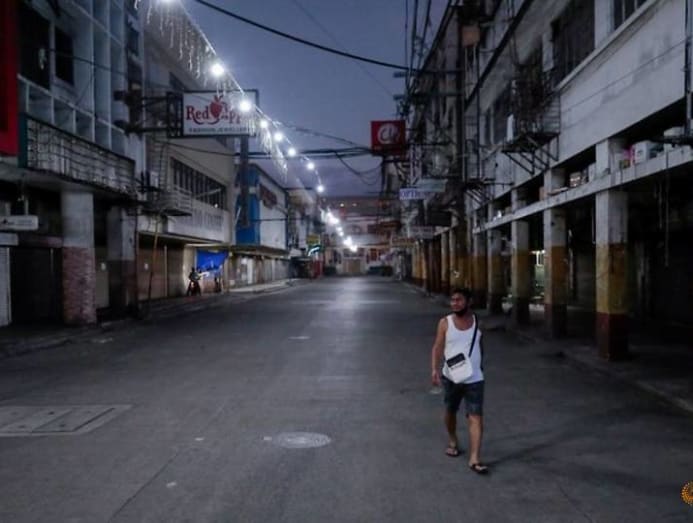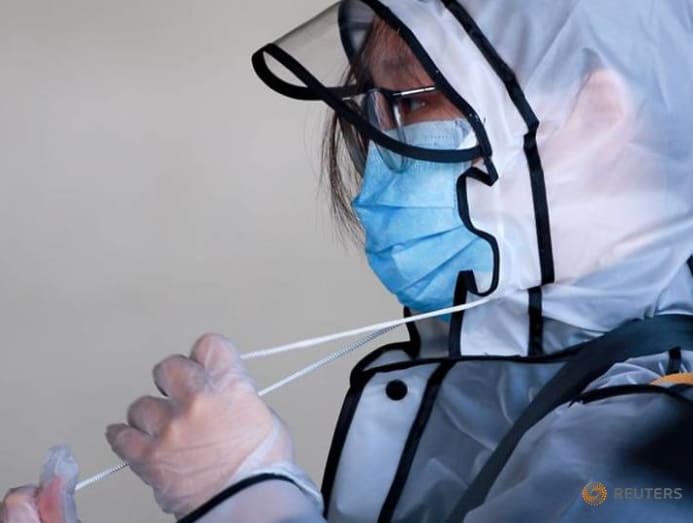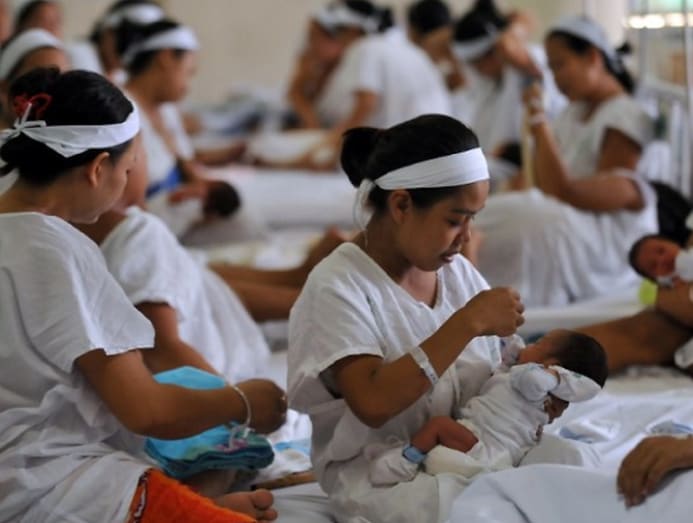Commentary: Philippines’ COVID-19 fight depends on the exploitation of healthcare workers
SINGAPORE: Much of the news on the COVID-xix pandemic has focused on government efforts to accumulate provisions needed to gainsay the virus: Surgical masks, protective equipment, and ventilators.
Yet, in the Philippines, the nation's stockpile evidently includes not just wellness supplies but health workers as well.
Widely known as a state that "exports" migrant labour to the earth, the Philippine state is at present temporarily banning the overseas deployment of Filipinos in 14 healthcare and related occupations, ranging all the way from doctors to the individuals who "repair medical hospital equipment".
THE Blitz FOR MORE MEDICAL PROFESSIONALS
As Apr 2, these wellness professionals are no longer allowed to leave the country to take on overseas work until the Philippines' COVID-xix crisis comes to an end.
On the surface, this deployment ban might make some sense. In the context of a pandemic, nations practice need qualified manpower to go on overwhelmed hospitals running.
READ: Commentary: Farmers agree cardinal to feeding Asia amidst COVID-19 restrictions
READ: Commentary: Restrictions on movements in some Southeast Asian countries to fight COVID-nineteen have been patchy, even scary
The Philippines has seen well-nigh 5,000 cases of infections as of April 13, with 284 deaths. The county too has one of the everyman medico-to-population ratio in the region, at half dozen for every 10,000 – a quarter of that compared to Singapore and half of Malaysia'southward.
Shortly after the policy was announced, the Philippine Medical Association declared support, arguing that as more doctors fall sick, others should be available to take their place.
The Philippine Overseas Employment Administration (POEA), the state agency that regulates the emigration of Filipino migrant workers, also rationalised that even without the deployment ban, most destination countries take closed their borders.

Suspending the deployment of health workers from the Philippines would make footling departure to the situation apart from clarify that such human resources could be redirected towards national health needs.
DEPRIVES OTHER COUNTRIES OF VITAL HEALTHCARE MANPOWER
Yet, in the context of a pandemic, the notion of creating a "reserve" of health workers raises a number of problematic issues.
Offset, while many countries take closed their borders to foreigners, some have been waiting for the inflow of Filipino health workers.
Germany, which has a bilateral agreement with the Philippines that allows Filipino healthcare workers to find employment there, found plans to fly in 150 medical staff put on hold later on the ban was imposed.
READ: Commentary: Nosotros are failing to manage the logistics of COVID-xix deaths
READ: Commentary: The battle over office leave has been worsened past the coronavirus
This need has become especially dire as COVID-19 depletes local hospital staff.
Moving overseas is a lengthy process involving months of paperwork, thousands of dollars in visa fees, and hours spent obtaining the necessary certification to practice one's profession. A deployment ban puts all these investments – both from migrants and potential employers – at gamble of going downwardly the drain.
Days subsequently the policy was enacted, Filipino nurses who had been visiting family in the Philippines were besides prevented from returning to their employers in places such as Federal republic of germany and the United Kingdom.
There was confusion as to whether the deployment ban but practical to newly hired health workers or those who already have existing contracts overseas. The government eventually allowed the latter to get out, but only after an uproar on social media.

THE PROBLEM WHEN EXPORTING MANPOWER HAS BEEN A NATIONAL GROWTH STRATEGY
Some might argue that the Philippines is not the but state controlling the overseas motion of its health professionals. In Feb of this year, Taiwan besides required its health workers to obtain "special permission" from the government before travelling overseas.
Withal, dissimilar the Philippines, Taiwan is non a large source of migrant health workers. In enforcing a deployment ban, the Philippine state also suspended bilateral agreements with countries that had sought Filipino workers to plug in labour gaps inside their ain healthcare systems.
2d, the deployment ban makes the assumption that the Philippines truly "lacks" all types of health workers. On the i hand, information technology is true that the land has long suffered from a shortage of medical doctors.
READ: Commentary: Republic of indonesia's COVID-19 fight has deeper challenges
READ: Commentary: Social distancing works, even if information technology doesn't immediately show results
On the other mitt, the Philippines also has a massive oversupply of nurses. In 2011, advocacy groups reported that a staggering 300,000 Filipino nurses were either unemployed or non practicing their profession. Little has changed since then.
LOTS OF HEALTHCARE LABOUR BUT NO JOBS
How did this happen? In my own research, I documented how the Philippine government and individual nursing schools actively marketed the nursing profession as a stepping stone to emigration, encouraging thousands of Filipino youth to invest in nursing degrees as a ways to admission overseas opportunities.
I spent the last x years tracing the experiences of the nurses who tried to accept advantage of this nursing boom, yet were unable to find infirmary jobs after graduation. This problem was non due to a lack of need, but rather a shortage of permanent positions within the state's by and large public healthcare institutions.

It is painful to note that earlier COVID-19 reached the Philippines, few state officials were invested in absorbing this big pool of qualified professionals into the healthcare arrangement. Instead, authorities units disbursed small funds to hire nursing graduates on three-month contracts with no promise of renewal.
With and then many applicants and too-few positions, nurses were asked to drop their names into a tambiolo or raffle drum in order to "win" a gamble of working at the local hospital.
Meanwhile, Philippine labour officials encouraged unemployed nursing graduates to explore other health-related fields and shift towards becoming massage therapists or medical transcribers in the country'southward call heart industry.
In other words, the Philippine state dealt with its oversupply of nurse labour past convincing nurses to do anything only be nurses.
A Brutal EXPERIENCE FOR NURSES
For nurses who at present find themselves stuck at abode, the circumstances are both ironic and cruel. The deployment ban sends a bulletin that their labour is at present valued and essential.
Simply on the basis, there are few signs the state is truly defended to changing the atmospheric condition that drives them overseas: Poor wages, overwork, and the lack of gainful employment.
READ: Commentary: Perchance it'southward time to pay more for grocery and food deliveries
READ: Commentary: COVID-19 may exist a mild disease for most people
Perhaps most telling is when COVID-19 escalated into a crisis, the Department of Health called on nurses to volunteer in Philippine hospitals, initially offering a measly assart of US$x per day with no health insurance or benefits.
In many ways, the biggest question that emerges from the deployment ban is whether health workers are truly human resources that the Philippine regime intends to retain and uphold, or but like the masks and personal protective equipment stockpiled in national reserves — of import in times of emergency, yet discarded once used.
BOOKMARK THIS: Our comprehensive coverage of the coronavirus outbreak and its developments
Download our app or subscribe to our Telegram aqueduct for the latest updates on the coronavirus outbreak: https://cna.asia/telegram
Yasmin Y Ortiga is an Assistant Professor of Sociology at the School of Social Sciences, Singapore Direction University. More of her research tin can be institute in her book, Emigration, Employability, and Higher Education in the Philippines (Routledge).
Source: https://cnalifestyle.channelnewsasia.com/commentary/commentary-philippines-covid-19-fight-depends-exploitation-healthcare-workers-290396
0 Response to "Commentary: Philippines’ COVID-19 fight depends on the exploitation of healthcare workers"
ارسال یک نظر